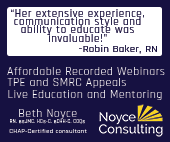By Kristin Rowan, Editor
March 12, 2024, the National Association for Home Care and Hospice (NAHC), Leading Age, the National Hospice and Palliative Care Organization (NHPCO), and the National Partnership for Healthcare and Hospice Innovation (NPHI), published their findings from a 2023 survey on regulation. These findings were presented to Congress and CMS earlier this year. The organizations surveyed 133 respondents, who noted regulatory issues as the top concern for providers. Of particular concern was the audits that have been increasing steadily for years.
More than half of respondents said they have undergone simultaneous audits, usually the TPE and SMRC audits. 52.9% of respondents said they had multiple audits within six months of each other, conducted by different contractors, and more than half of those said they had to submit the same charts for each audit.
Hospice Auditor Issues
The findings indicate some issues with the training, knowledge, and integrity of auditors. Many respondents indicated having received denials of physician visits, documented separately from face-to-face visits, simply because they occurred on the same day. Some reported denials due to the absence of an IDG meeting even when no IDG meeting was required. Multiple respondents said the denial reasoning was copied and pasted from past denials and/or that the auditor did not seem to have read the documentation that was sent.
Auditing Inconsistencies
The report findings indicate that there are often delays in receiving audit results, sometimes up to 18 months. Some RAC audits had listed available dates for findings, but the findings were not actually available for several months after the listed date. Respondents also indicated that instructions from the auditors were presented using terminology that was not consistent with standard operating procedures in a hospice environment (read: auditors are using hospital lingo and expecting hospices to understand it).
Technical billing issues, when payments are denied not due ineligibility, but because of missing or incorrect information, can be corrected and then processed and paid. However, several respondents indicated that different MACs give different information on how process corrections for election statements and election addendums.
Gross Miscalculations
This was reported in the survey only once, but, as with any survey, extrapolating the data to the whole population, one must assume it has happened more than once: A hospice provider had a claim denied while under a CERT audit. The denial was due to the auditor decided that the patient was not terminally ill, even though the patient expired during the audit.
Recommendations for CMS
The organizations have some recommendations for changes:
-
- CMS should re-focus its audit contractors on patterns and practices characteristic of providers that aim to minimize or avoid therapeutic care and supportive services that are required under the hospice benefit and fully reimbursed through the per diem payment.
-
- CMS should require substantive education and training for all auditors that is consistent with the education given to providers to minimize inconsistencies.
-
- CMS should increase transparency of audit contractor activity, including the number and types of audits being conducted, audit recovery amounts, results of audits by specific audit contractors, including reversal rates, top denial reasons and compliance with required timeframes for notification and review.
-
- CMS should implement an informal mechanism to enable MACs and hospice providers to resolve technical claims denials prior to engaging in the formal appeal process.
- CMS should require audit contractor medical reviewers to have an equivalent level of expertise and training in hospice care as the hospice medical director who certified a patient’s terminal illness.
According to a statement from NAHC, in 2023, the organizations have submitted 34 recommendations to CMS. To date, half of them have been implemented. They will continue to work with CMS toward enhanced transparency, equitable auditing, and targeting genuine fraud, waste, and abuse.
# # #

Kristin Rowan has been working at Healthcare at Home: The Rowan Report since 2008. She has a master’s degree in business administration and marketing and runs Girard Marketing Group, a multi-faceted boutique marketing firm specializing in event planning, sales, and marketing strategy. She has recently taken on the role of Editor of The Rowan Report and will add her voice to current Home Care topics as well as marketing tips for home care agencies. Connect with Kristin directly kristin@girardmarketinggroup.com or www.girardmarketinggroup.com
©2024 by The Rowan Report, Peoria, AZ. All rights reserved. This article originally appeared in Healthcare at Home: The Rowan Report.homecaretechreport.com One copy may be printed for personal use: further reproduction by permission only. editor@homecaretechreport.com



